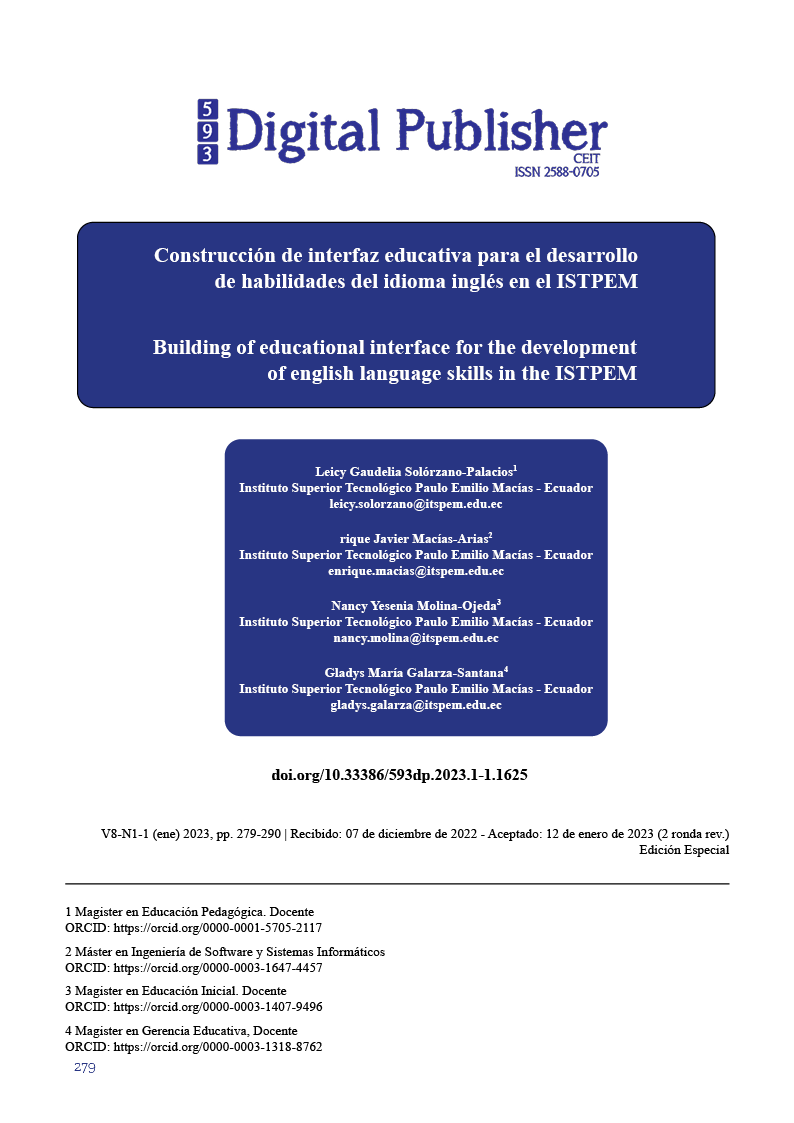Building of educational interface for the development of english language skills in the ISTPEM
Main Article Content
Abstract
The construction of an interface as an educational instrument for the development of skills where English language skills are developed at the Paulo Emilio Macias Higher Institute where the learning of this language has been a problem for students because methodologies that are not at a higher education level are used. In this research it is proposed to build a didactic educational interface so that students can develop their skills and abilities in the English language and thus be able to achieve their certification of English proficiency, which is why it is a requirement to be able to graduate as technologists. Considering that this proposal tries to deepen learning and allow them to achieve their knowledge in the English language. The results of this research are the positive percentage that has acquired through the educational interface a high knowledge with the different didactic activities, where the student reached a level of proficiency of English A2.
Downloads
Article Details

This work is licensed under a Creative Commons Attribution-NonCommercial-ShareAlike 4.0 International License.
1. Derechos de autor
Las obras que se publican en 593 Digital Publisher CEIT están sujetas a los siguientes términos:
1.1. 593 Digital Publisher CEIT, conserva los derechos patrimoniales (copyright) de las obras publicadas, favorece y permite la reutilización de las mismas bajo la licencia Licencia Creative Commons 4.0 de Reconocimiento-NoComercial-CompartirIgual 4.0, por lo cual se pueden copiar, usar, difundir, transmitir y exponer públicamente, siempre que:
1.1.a. Se cite la autoría y fuente original de su publicación (revista, editorial, URL).
1.1.b. No se usen para fines comerciales u onerosos.
1.1.c. Se mencione la existencia y especificaciones de esta licencia de uso.
References
Bacca, E. (2018). Estrategias para el fortalecimiento de la habilidad de comprensión lectora para la lengua extranjera inglés, a través de ambientes de aprendizaje mediado por las TIC. 1-30.
Beltrán Gómez, M. I. (2019). El uso de recursos TIC como apoyo pedagógico con el fin de fortalecer la habilidad de escritura en inglés de los estudiantes del grado primero curso 103 del I.E.D Marco Tulio Fernández. Universidad Libre de Colombia.
Bernedo-Soto, M. L., & Murillo-Ticona, T. A. (2022). Las herramientas digitales como complemento de los aprendizajes del idioma inglés: Una revisión de la literatura. 7(4), 17. https://doi.org/doi.org/10.33386/593dp.2022.4.1104
Burbat, R. (2016). El aprendizaje autónomo y las TIC en la enseñanza de una lengua extranjera: ¿Progreso o retroceso? 26, 16.
Cenich & Santos (2015). Propuesta de aprendizaje basado en proyecto y trabajo colaborativo: experiencia de un curso en línea. Recuperado de: http://www.scielo.org.mx/scielo.php?script=sci_arttext&pid=S160740412005000200004
Casal, S. M. S. (2015). METODOLOGÍA DIDÁCTICA EN ENTORNOS VIRTUALES DE APRENDIZAJE. 3, 9.
Chaparro-Aranguren, R. L., & Narváez-Hernández, A. L. (2021). Diseño de un ambiente de aprendizaje para fortalecer la escritura del idioma inglés en secundaria. 14.
Digión, L. B., Álvarez, M. M., Digión, L. B., & Álvarez, M. M. (2021). Experiencia de enseñanza-aprendizaje con aula virtual en el acompañamiento pedagógico debido al Covid-19. Apertura (Guadalajara, Jal.), 13(1), 20-35. https://doi.org/10.32870/ap.v13n1.1957
Encalada, O. (2022). APLICACIONES MÓVILES Y LA PRODUCCIÓN ORAL DEL IDIOMA INGLÉS. Pontifica Universidad Católica del Ecuador.
Hernández, M. M. (2007). Aplicación móvil para el aprendizaje del inglés utilizando realidad aumentada. 18.
Ovies, An. (2012). Software para el desarrollo de la habilidad de la escritura en idioma inglés con fines profesionales para los estudiantes de Psicología de la Universidad Central «Marta Abreu» de Las Villas. Universidad Central «Marta Abreu» de Las Villas.
Pacheco, J., Galvis, B., & Valencia, J. C. (2018). Herramientas virtuales para el aprendizaje de inglés.
Peña Acuña, B. (2015). La observación como herramienta científica. ACCI.
Rivera, M. (2020). Fomento de las habilidades oral y escrita en L2(inglés) de estudiantes de tercero de [Universidad del Norte]. https://manglar.uninorte.edu.co/bitstream/handle/10584/9268/141205.pdf?sequence=1&isAllowed=y
Unesco. (2015). Directrices para los recursos educativos abiertos (REA) en la educación superior. https://unesdoc.unesco.org/ark:/48223/pf0000232855
Unir. (2020). Gamificación en el aula: Ventajas y cómo aplicarla. UNIR. https://www.unir.net/educacion/revista/gamificacion-en-el-aula/
Yumi, L. M., Padilla, N. M., Padilla, Y. N., & Obregon, A. P. (2020). Mejoramiento del Speaking en el idioma inglés con el uso de WhatsApp. Revista ESPACIOS, 41(02). https://www.revistaespacios.com/a20v41n02/20410210.html





